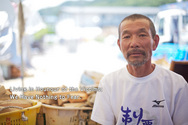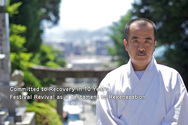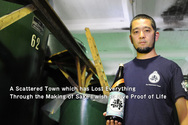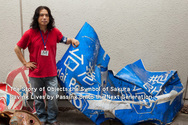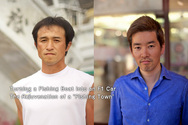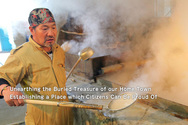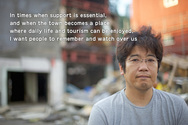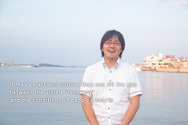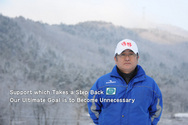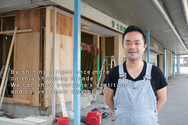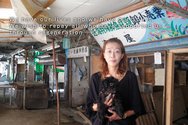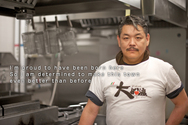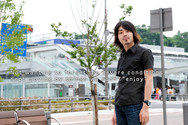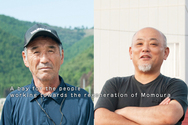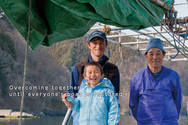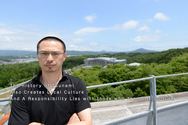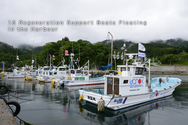Project area:Iwate Prefecture, Tono City
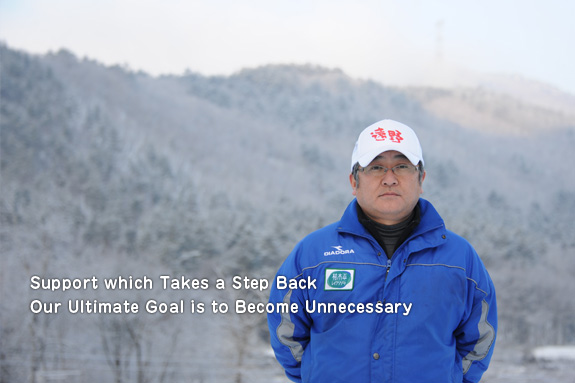
Support which Takes a Step Back
Our Ultimate Goal
Is to Become Unnecessary
The reason why the biggest volunteer centre
In Iwate was established
Immediately after the disaster various volunteer centers were initiated all over the region and up until January 2012 over 920,000 people had come to volunteer (according to the Japan National Council of Social Welfare "Disaster Volunteer Centre Volunteer Count"). Tono Magokoro Network, based in Tono City, Iwate Prefecture, is Iwate's largest volunteer centre. Tono Magokoro Network began its activities on 13th March 2011 in Tono City, a one-hour drive from the Sanriku coast, where it has established an office and accommodation quarters which have welcomed 48000 volunteers to date (as of 15th January 2012).
"Two days after the disaster I entered the affected area with all the supplies I could carry. When I asked at the Ootsuchicho Emergency Centre if they had a map, all to be found was a hand-drawn map on the side of a wall. I thought the first thing we had to do was to make a map for the area and so over a period of two days we located all of the evacuation centres, researched the numbers of people staying in each, and created an evacuation centre map. We started to do what we could in the situation and we have continued with such efforts since."
While going out to deliver emergency supplies in response to the needs of communities along the coast, Tada was often met by the scene in which streets already narrowed by debris became blocked with the cars of people coming to volunteer. As the number of cars increased, Tada had concerns that this would cause a hindrance to relief efforts, so he began to actively engage in finding individual volunteers.
"I started the call because when entering the disaster area I could clearly see that we could not deal with this alone, but also because I wanted to prevent a confused mass of people and cars gathering at this site. If the area was flooded with people and goodwill then it would become too exposed. In order to prevent this it was necessary to gather individual volunteers in Tono and make teams to ensure they did not enter into areas they should not, and prevent a confusion of cars and people."
Their engagement is not restricted to the organizing of volunteers but also includes connecting with around 70 organizations in clearing debris, offering counseling and community support, protecting the stance of "working together towards what the people of the community want". When clearing debris of houses they always made sure the homeowner was able to observe, and on occasions only a small team of staff would gather, letting the local people take the lead. With this experience Tada has a particular thought in mind.
"Our ultimate goal is to achieve the condition in which our presence is no longer needed. We are not doing this activity for ourselves. We do not put ourselves first, but are pursuing a form of support in which we can" take a step backwards" in order for local people to take the initiative, taking care to form a structure in which those around us can bring out their own strength to the full. Once we are no longer necessary, we will dissolve."
We have the role of supporting not "making"
It has been one year since making the evacuation centre map. When Tada reflects upon the activities up until now he says "I don't feel as if I have gone to great trouble".
"Volunteering is not a competition, so there are no winners and losers, but we do have times when our feelings are distorted and we feel as if we have failed. But if our spirits fail then we cannot continue. In order to prevent this we hold onto the fundamental sentiment that "even if we can't win lets not lose". Now local people are considering many things and are attempting to create their own town. Our role is to ask locals "what kind of town do you want to create?"and debate this question together. We are not the ones who should be making anything."
It is therefore necessary to create a space where by the people living in this town can visualize what they want to do and what kind of town they wish to create. Furthermore, Tono Magokoro Network does not only offer support towards the community from the perspective of it being a "disaster area", but attempts to relate to the whole of the community on both public and private levels. This is the work of Tono Magokoro Network and the reason that it has joined with so many other organizations. In addition, in order to further the support offered to affected areas, "Tono Magokoro Network Tokyo Office" was opened on 13th December 2011.
"There is some plan to build a seawall for example, but we have to develop plans which think more about how to coexist with nature. If we do not inspect the many possibilities we cannot devise a clear vision, and if we do not have a clear vision we cannot formulate a structure. Furthermore, with regard to this structure it is not just a case of "make and use" but "using with care". We must make a platform in which to share opinions between local people, authorities and logistic support groups like us, taking more care in the creation of a better vision."
Interview: 19th January 2012 Tono City, Iwate Prefecture
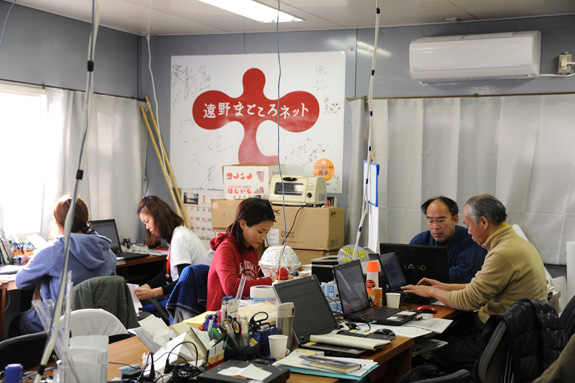
Tono Magokoro Network's base "Tono Joka Centre". Here there is an office as well as accommodation for volunteers who visit the centre from all over the country.
